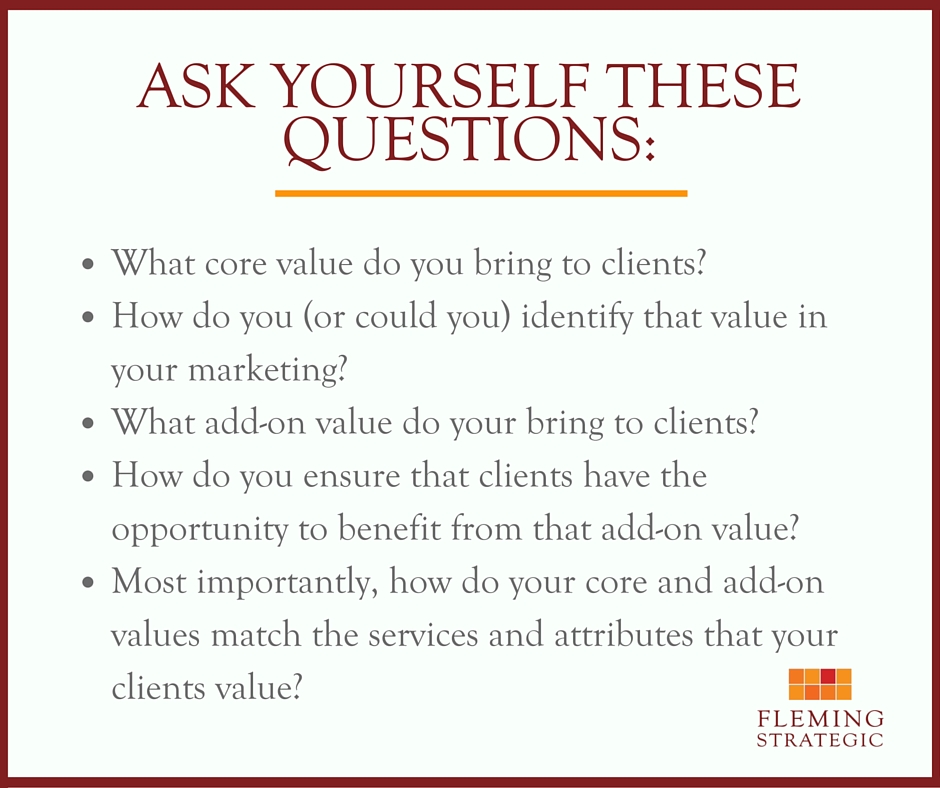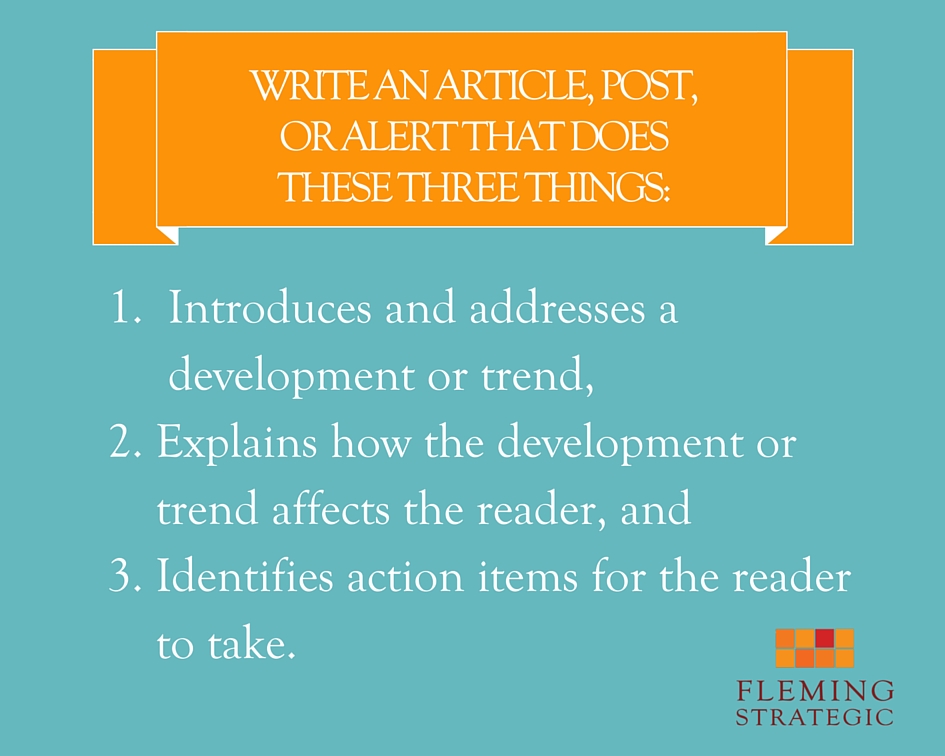Archive for month: February, 2016
What’s every client’s favorite word?
/0 Comments/in Business Development /by strategicOn one level, clients are looking for different things as they choose and work with attorneys. Some want a budget provider who will do the minimum necessary or collaborate closely with in-house counsel or business people for DIY completion. Others want to hire the most prominent, best known, most expensive lawyers to appease the Board of Directors or to show another party that a matter is getting serious attention. Yet others look for a lawyer who has connections to useful people or businesses, and others prefer to work with lawyers who have implemented legal project management. You get the idea, and the variations are endless, especially once you consider clients who seek a combination of attributes.
But there’s one word that sums up what every client is seeking: value. The budget-seekers measure value in terms of the legal spend. Those seeking a lawyer with connections define value in part in terms of getting introductions that will expand their reach in some way. Those seeking the authority in the field measure value in terms of top quality legal work, of course, but they also expect to benefit from the top lawyer’s reputation and successful track record. These (and a myriad other ways of determining value) should affect your marketing in at least two ways:
- You must know what core value (other than quality legal work) you bring to the class of clients you serve and identify that in your marketing. This is one aspect of differentiating yourself from other practitioners in your field. The differentiating factors that matter are those that your clients value. If what sets you apart isn’t something that your clients value, it’s a distinction that won’t have any substantial effect in growing your practice.
- You must find ways to create value for your clients in the course of your representation. Think of this as an “add-on” value that’s above and beyond the core value you identified to differentiate yourself from others. Examples might include sharing information about a trend you’ve identified, offering educational material to support the legal work you do (a pamphlet about ways to attract investors to a start-up or an annual email that invites clients to see whether they need to update their estate plan, for example), or a directory of providers in fields that would benefit your clients.
Take this non-legal example to illustrate the two kinds of value. When you think about car repairs, the most important thing is likely that the repairs be completed correctly, within a reasonable time, and for a reasonable price. Core values that might attract you to a particular garage would include a focus on particular brands of cars or using only factory-authorized parts. Repair shops would promote those points of differentiation because they may be decision factors. Add-on value would include the availability of a comfortable waiting room with wi-fi, a quiet area, and good coffee. Chances are that you wouldn’t decide on a repair shop solely based on that add-on value, but you would appreciate it, you might tell others about it, and you might find the repair process better because of those perks.
Your action item:
How to write well for marketing purposes
/0 Comments/in Business Development, Content Marketing /by strategicLast week, I had two strategic planning sessions with private clients. As usual, writing (articles, blog posts or comments, newsletters, client alerts, etc.) featured prominently in both of the business development plans we created. And also as usual, my clients each asked why they should bother writing, when so many other lawyers are already writing on the same topic. It’s a smart question that each lawyer must answer before pinning marketing hopes on writing.
Here’s what it boils down to: to be effective, you must cut through the tremendous amount of noise that your target audience confronts daily. Blog posts, articles, and client alerts too often regurgitate the no-longer news about a legal development without extending any analysis that makes the information relevant to the reader. Given the availability of “as it happens” information about legal developments, simply being a reporter won’t cut through the noise, and it won’t get useful marketing attention.
So what does make written product effective for marketing?
This infographic summarizes these steps, along with several others that will make your written marketing product useful for readers and therefore effective for marketing.
Is writing an effective tactic in your business development plan? If you’ve recently written something for marketing purposes, review it now to ensure it complies with these guidelines. And if you haven’t written for marketing purposes, brainstorm at least 10 subjects you could write about a set a deadline for yourself.
How you revive a neglected professional relationship.
/0 Comments/in Business Development, Coaching for lawyers /by strategicDespite the best of intentions, it’s easy to let a relationship slide. You may not appreciate the value of maintaining professional relationships, or you may simply get too busy to keep up with an effective follow-up contact schedule and system. It’s all too easy to allow a relationship to atrophy.
So… Can you resuscitate an atrophied professional relationship? Yes! By focusing time and attention on your relationship and maintaining consistent effort, you’ll often be able to revive a good relationship more easily than you built it in the first place.
But you might feel awkward trying to re-energize a stagnant relationship, especially if you aren’t sure that the relationship can be reinvigorated. Don’t write off a beneficial or enjoyable relationship is unless you have grounded evidence that it can’t be resurrected! It’s easy to allow discomfort to lead you into turning a neglected-but-viable relationship into a dead one, and lawyers far too often give up on relationships before they’re truly finished. But how do you know? Or, as someone often inquires when I’m presenting a business development workshop, Is it ever too late to rebuild professional relationships that have languished?
The short answer is that it depends on nature and character of the relationship. The deeper the relationship was in its heyday, the more likely it can be resurrected later. If, however, you meet once and fail to follow up, or if you follow up only once or twice, the relationship will lack the firm footing necessary to allow it to flourish following a period of silence. That said, it never hurts to try to rebuild a relationship, particularly if your sole reason for reconnecting is to re-establish communication and not to seek a favor. (If you haven’t been in reasonably consistent contact with someone, chances are that a request for a favor will be met with silence. Pick your battles accordingly.)
So, what can you to do rebuild a connection that has faded? The simplest, and often the most effective, approach is to do precisely what you would do with a friend you haven’t seen in a long time: pick up the phone and say, “I realized it’s been a while since we’ve spoken, and you’ve been on my mind. Is this a good time to talk for a few minutes? How are things with you? What’s new?” If several months have passed since you were in touch with this contact, you may even begin the conversation by re-introducing yourself. (This is where my recommendation to maintain a database of contacts proves especially helpful: you don’t have to try to remember when and where you met.) You may experience a few awkward moments as your contact gets back into the connection, but most people will pick up relatively quickly. Better yet, leave a warm voicemail expressing your desire to reconnect, giving your contact the opportunity to recognize your name and remember your relationship before getting into conversation with you.
If, like many lawyers, you’d rather do nine hours of painstaking document review without a coffee break than pick up the phone, you do have other options. For example, you might consider the following:
- Send an email to reconnect. You might suggest talking by telephone and either arrange a time to let your contact know you’ll be calling. While you’ll still have to pick up the phone, you’ve created an expectation that you will call, and chances are good that you’ll avoid an awkward beginning. If you suggest that you’ll call, though, you absolutely must do so — or run the risk of looking like a flake.
- Send an article or other resource that will interest your contact. The resource may address a legal or non-legal issue, but it must be tied in some way to a conversation you’ve had with the contact. Attach a note that says, “I remember talking with you about [topic of resource] at [wherever you had the conversation] and thought of you when I saw this [resource]. Hope it’s useful!” By doing so, you not only reconnect by offering assistance, but you do so in a way that will bring your conversation back to your contact’s mind and refresh the relationship.
- Issue an invitation. You might invite your contact to an open house or to attend a CLE or other seminar of interest with you. If you deliver an invitation by mail or email, be sure to attach a note saying that you look forward to reconnecting. This personal touch will indicate to your contact that your interest in genuine.
- Seek out news about your contact. This may be a more challenging approach if you’re seeking to reconnect than to maintain a relationship, but it’s worth a quick search to see whether your contact has been in the news recently. You may find news of a professional event (an honor awarded, a trial won, a leadership position attained) or a personal event (a new marriage, a new baby, a recreational or community activity). Such news offers an ideal reason to get in touch again.



